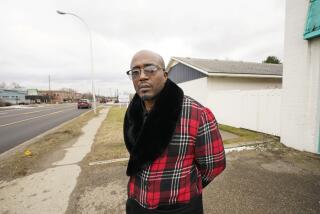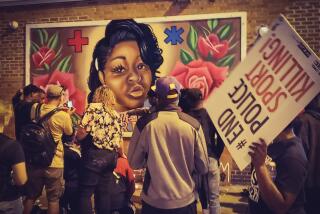Karachi’s War: Victims Can Be Found in Ranks of Police and Citizenry DECK Pakistan: More than 100 officers have died since June, some of them brutally tortured. The other victims are often members of a Muslim minority group.
- Share via
KARACHI, Pakistan — An 18-gun salute, a mournful chant and a final prayer mark the burial of another murdered Karachi policeman, a victim on the front lines of a city at war.
Since becoming police chief of Pakistan’s biggest city in June, Shoaib Suddle has buried more than 100 officers, some of them savagely tortured before being executed with a bullet in the back of the head.
“When I first arrived I went to the police lines to join a funeral almost every day. . . . I receive the dead bodies of my policemen who have been brutally tortured. Their bodies are drilled with holes,” Suddle said.
Police blame the militant wing of the Mohajir Qaumi Movement. They say the militants, armed with rocket launchers, antitank weapons and an array of small arms, are waging an urban guerrilla war on Karachi’s 22,000 police officers.
Mohajirs are Indian Muslims who moved to Pakistan when it was created in 1947. They say they are treated as second-class citizens, denied access to good jobs and education. They say resentment has been festering for years and young Mohajirs have turned to violence to demand their rights.
Attacks by Mohajirs have caused other groups to strike back, resulting in more than 1,600 deaths this year. Guns are also being turned on the police--so far this year, 200 police officers and 20 paramilitary Rangers have been slain.
In Karachi, where the majority of the 12 million people are Mohajirs, there is little sympathy for the police and often a great deal of support for the guerrillas.
Mohajirs have long complained of government discrimination and police brutality against their people.
“The Rangers and police can pick up anyone and say he’s a terrorist, and senior government officials don’t want to investigate or to get involved,” said Jamil Yusuf, head of a citizens-police liaison group.
“It’s frightening,” he said. “No one is safe.”
The line between lawbreaker and law enforcer is often blurred, Mohajirs say.
Zahoor, a Mohajir who would give only one name for fear of reprisals, recounted this incident: Late one night his car was stolen at gunpoint by a man wearing traditional Pakistani clothes. But when he went to the nearest police station to report the theft, the man behind the desk was the thief who stole his car.
Police routinely deny the charges, saying they are anti-authority propaganda. But the number of allegations is increasing.
Most Mohajirs accuse the police of being corrupt, abusing authority and, in recent weeks, killing suspects in custody.
“They can come at any moment, take you away and never tell a relative where they are taking you,” said a professor at a local college who would identify himself only as Majeed.
“The police stop you and they say: ‘You are a Mohajir. You should be dead,’ ” he said.
The authorities do not release figures on the number of suspects who have died in police custody, but at least 10 such deaths are known in the last two months.
In a recent case, Mohammed Tahir was picked up for questioning by police on Oct. 22. Less than 24 hours later, he was reported dead at a hospital. Officials released no details, saying only that an inquiry had been ordered.
Two weeks earlier, four terrorism suspects were shot dead while reportedly leading police to a gang hide-out in Karachi. Police said fellow gang members killed them, but the Mohajir Qaumi Movement charged that the four were murdered by officers.
One of the four, who was known as Fahim Commando, allegedly was responsible for the deaths of police officers.
The deaths led to a revenge attack on the family of a police officer. Gunmen stormed into a home and killed four relatives; a fifth relative was shot to death at a nearby house.
The war on the police gained momentum in recent weeks as the government stepped up its own campaign to flush out suspected extremists from hard-core Mohajir Qaumi neighborhoods.
International human rights groups say the government is ignoring mounting evidence pointing to possible police abuses.
In recent weeks, more than 100 alleged guerrillas have been killed in incidents that the police described as shootouts.
Mohajirs allege many of those deaths were staged killings by the police.
Suddle says his department is understaffed, overworked and underpaid.
But he concedes corruption is widespread and even acknowledges prisoners are tortured.
“Torture is a problem . . . but when your men are being ambushed every day, they react,” he said.
Suddle recently toured the city’s jails and called on police officers to ensure the safety of suspects in detention.
He has not, however, taken substantive action against any officers.
Suddle says an underlying problem is that the police force was created in 1860 during Britain’s colonial rule to terrorize the natives.
“The intention was to attract basically lower-class people, train them in the art of how to control the natives through terror and fear,” he said.
“Unfortunately, the system has stayed more or less the same.”
More to Read
Sign up for Essential California
The most important California stories and recommendations in your inbox every morning.
You may occasionally receive promotional content from the Los Angeles Times.













